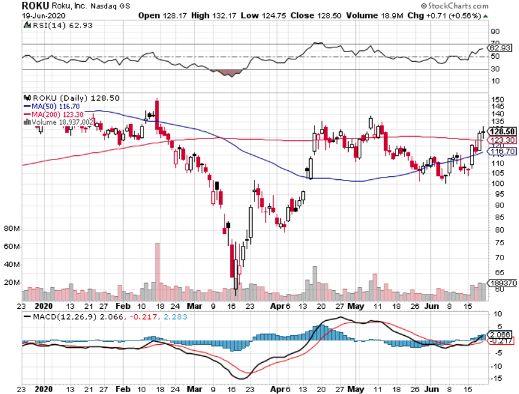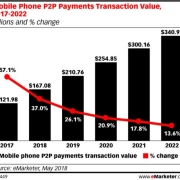Is Roku Breaking Out?
Roku (ROKU) is another tech growth stock that is a conviction buy in my eyes.
Never sell this company if you plan to be in this long term.
The only way a sell would make sense is if digital ads stopped existing or Roku’s platform somehow managed to blackball itself out of the digital ad landscape.
Both scenarios are highly unlikely.
What does Roku actually do?
This is the company that is single-handedly destroying linear television and is laughing all the way to the bank – or at least the shareholders are.
Roku is a leader in advertising-supported video-on-demand streaming services.
In layman’s terms, they basically run commercials on its own Roku Channel and other third-party channels.
A minor part of their business is involved in making set-top boxes and streaming sticks to plug into internet video services such as Netflix and Hulu.
Plus, it sells licenses to an operating system that is thrown up smart TVs.
To beef up its products and move up in the quality food chain, the streaming platform outperformer Roku (ROKU) has agreed to a data exchange agreement with supermarket giant Kroger (KR).
Roku will apply data from the supermarket chain in its recently launched shopper data program.
The tech firm will finally get a peek deep inside the psyche of the American consumer.
I also believe this is the beginning of a massive wave of data-sharing partnerships as companies desire to understand their consumers deeper at a time when the coronavirus shut their consumers inside their house with nowhere to go.
So, how will Roku parlay this partnership into more revenue?
As people cord cut, the main goal is to seduce advertisers away from linear TV.
Juicing up its targeting abilities by using Kroger’s leading data science KPM (Kroger Precision Marketing) program, Roku will be able to move closer to the customer’s digital wallet enabling them to anticipate what they buy and how much of it they want.
The ads will be pricier because Roku will be able to hyper-target specific audiences due to a higher quality set of data they will have to work with.
From the CPG marketers’ perspective, supermarket brands will apply the data from Kroger’s KPM platform to better target the approximately 40 million and growing households using Roku, thus enabling them to better gauge which ads viewers are more likely to respond to.
Kroger will be able to understand more about their audience by assessing what commercials they consume and how they can adjust and expand their supply of goods to better capture the demand of their shoppers.
Getting more bang for their buck is a winning strategy for Roku as they delve deep into the mystical art of artificial intelligence to offer a better ad funnel.
Kroger Precision Marketing (KPM) spans 60 million US households which is not shabby itself. Marrying the 60 million with the 40 million to create a 100 million data analytics treasury trove means that Roku has just become 20% more valuable in a blink of an eye.
Roku's international growth could experience the same type of meteoric rise as what Netflix had.
If Roku can accumulate 82 million active accounts by 2025, it should have $4.5 billion in annual platform revenue.
This would mean that Roku's market cap would be around $40 billion to $50 billion in 2025. Its current market value is about $16.5 billion.
Roku still has its share of headwinds and are still loss-making.
The company reported a 45-cent loss per share for the first quarter, in-line with analyst expectations and revenue of $321 million beating the estimates by $13 million.
Since the company is still a “growth” company, investors still look through the losses to glorify growth, and Roku reporting 39.8 million active accounts, up 37% from a year ago, means they are on track.
Another concern is the higher-than-normal number of cancellations in the short-term even though its long-term runway is still solid.
However, I would say the biggest problem Roku faces is that the stock is just too hot pricing around many investors looking to put new money to work in shares.
The stock has doubled since the March lows.
In short, unless the government bans digital ads, Roku is poised to harvest the lion’s share of the spoils of the streaming revolution.
I am highly bullish on Roku shares.



